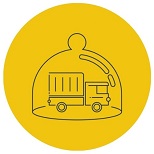Ukrainian grain market development: Lawyer’s opinion
Ukrainian grain market development: Lawyer’s opinion
The Ukrainian grain market is consolidating. Everyone can see clear vertical integration. Almost all large holding companies already have their own terminal facilities, transport companies, transport units, including railway… After joining the WTO, many new opportunities have opened up for Ukraine. In particular, it was facilitated by the reform of the Ukrainian internal processes. Ukraine burst into the agricultural market in China, Asia, and now is planning to enter the African market.
Artem Skorobogatov, Partner Interlegal
The Ukrainian grain market is on the rise. Over the years, the Ukrainian grain market has not only changed but has grown in every sense of the word. Today Ukraine is one of the three largest grain suppliers to the world market and plays a vital role in global food security. Interlegal law firm from Ukraine are in the middle of grain consulting for 25 years and we asked Interlegal partner Artem Skorobogatov about grain market development for 20 years, in particular, about the legal
Artem, in your opinion, how has the grain business in Ukraine changed for the last decades?
Thank you for your concern. Indeed, as a 25-year-old law firm specialized in agricultural trade and international transportation, we have a unique opportunity to observe dynamic market development as legal advisor to all its players: buyers, sellers, carriers, freight forwarders, terminals, etc. And we directly participate in various solutions to completely different risk scenarios, caused both by human errors or intent and by objective factors or events worldwide. Yes, a lot has changed. Within the country, it is easy to see fundamental changes in infrastructure and technology, communications and market structure. A lot has also changed in the world, at least Ukraine has been WTO member for 13 years, which provided new opportunities to farmers. Therefore, both the role of Ukraine as a global agricultural market player and the market itself within the country has changed. That is, almost everything has changed.
Why almost? What did remain unchanged?
The most stable, probably, are people. Despite the fact that many new specialists have grown up inside and outside the agricultural business, the backbone of the industry is the same as 10-15 years ago. In my opinion, it is not only the key to industry success but also one of the pillars for preserving statehood in this difficult time for the country. Agricultural business is not only a significant part of Ukraine’s income but also includes hundreds of thousands of educated and independent people, whose well-being and success are tightly related to the Ukrainian land and its fruits. You cannot take the land with you and leave for another country, so they will hold on and defend their interests therein. Unlike coal mining or metallurgy, this is a huge number of independent and competing business entities and experts. A very powerful community capable of uniting and standing up for itself. The result of forming such lobby is that for many years any government initiatives and legislative changes related to the agro-industrial complex shall be subject to preliminary discussion with agricultural business representatives. For a long time, there is no practice of spontaneous export barriers (moratoriums, etc.) not coordinated with industry associations, as we see in some competing states. This is a significant achievement and the state has to reckon with it.
How do you think, what changes in infrastructure are the main ones?
Agricultural infrastructure has changed enormously. It is difficult to detach just one factor. Ukraine has insignificantly changed agricultural product consumption for recent years, which is not surprising since the population continues to decline.
However, production volumes increase significantly due to increased experience and manufacturability of production, such as competent use of fertilizers, high-quality selection of seed, etc. It means that Ukraine can and should export more and more products every year, at least until it catches up with other agricultural exporters on yield volumes. Based on this scenario, for all these years, internal storage capacities have grown at an accelerated pace and are still growing now, which allows maintaining grain quality for many months in anticipation of a favorable export price.
But agricultural products cannot be stored forever, so sooner or later they will be sold and exported from the country. Historically, Ukraine has a large number of seaports, and it is quite logical that agricultural products are exported mainly by sea. This segment of infrastructure has also changed significantly.
Thanks to (and sometimes in spite of) public-private partnerships, there is a constant dredging process at the Ukrainian seaports, facilitating increase in size and number of vessels handled and stimulating the expansion of existing port terminals and construction of ones.
When logistics between inland elevators and port terminals has become a keystone, inland logistics faced significant changes. There appeared line transportation by rail, private depots of railway wagons, active conversation about private railway haulage, while the struggle against overloading in road transport is still lasting. It took several years to adopt the law “On Inland Water Transport” designated to gradually unload and supplement road and railway logistics with transportation along the Dnieper – the largest waterway in Ukraine.
What did all these changes cause?
First and foremost, the trade market has changed significantly. If previously there were 4-5 intermediaries during transportation from the field to the port, while each earned from 2 to 10 US dollars per ton, now there are maximum 2 such intermediaries and they often work with the risk of negative margin.
There are many reasons for such situation, but mainly it is the speed of obtaining information, its quality and exchange of such information. Due to the widespread launching the Internet and mobile devices, increase in English proficiency, jointly with increasing scope of information in Russian and tools for information exchange, the opportunities and commercial literacy of manufacturers and traders increased tremendously.
Small and large manufacturers, who neither have the time nor want to follow price changes and trends, are ready to help free experts who left large trading companies and provide commercial services in price risk analytics.
There are emerging and developing IT platforms that facilitate getting the best price offers for their product with trusted counterparties, without leaving home.
Everything occurs in view of significant increase in possibilities for high-quality and long-term storage of almost any volume, as mentioned above.
You often speak about the consolidation of players in this market.
Yes, it also plays a crucial role. Among the market top 20, the situation is fundamentally different, as compared to medium and small traders. There is also Ukrainian specificity. For example, several large and well-known defaults last year significantly changed the market situation. First, compliance requirements in international companies have become more stringent. They have become more selective, more attentive, more demanding.
Strict compliance is also supported by the deoffshorization factor. Previously, we held seminars upon opening a company and bank account in a few days. Today it has become much more difficult to open an account in a foreign bank and commence working. Governments and regulators set their own strict requirements, and it is no longer possible to change companies. Of course, it has many advantages for the rules of the game in whole. It is not so easy to withdraw from the company and to open a new one, if the deal is not profitable; people highly appreciate their reputation and their tools. In the long-term prospect, the market will get more civilized and the conduct of business will be predictable. Therefore, we are pleased very much, on how our corporate and tax practice is growing in terms of building long-term reputable corporate structures. CFC, BEPS, tax structuring – such issues much more often appear in customer’s requests. It means that business has come to terms with the new reality and is adapting there to.
It is getting more civilized, isn’t it?
Yes, we may say so. The fact is that information today spreads almost instantly. If any market player fails to fulfill its obligations, everyone will get aware immediately.
Think back to last year’s defaults. Everyone said that something terrible would happen now, everyone would declare defaults… However, nothing happened on a massive scale. Most companies could achieve an agreement, and almost everyone, one way or another, reached a compromise with their counterparties – either with lawyers engaged or by their own forces – it does not matter. It is important that market has managed to come to an agreement, to preserve relations and to maintain business.
You say that market is consolidating. In which direction is this process going?
Yes, everyone can see clear vertical integration. Almost all large holding companies already have their own terminal facilities, transport companies, transport units, including railway. Now the opening of river shipping is seriously stimulating investment in the Dnieper river fleet. Almost all the customers to the deals on fleet sale and purchase we had this year are agribusinessmen. They register fleet under the Ukrainian Slovakian, Moldavian and Georgian flags. We like such deals because they are large and interesting, clients need to structure the company, to structure the deal, to develop a contractual framework in view of international specifications.
The most difficult challenge for us as legal business is maintaining the required speed and quality of services, with regards to the growing demand and active market expansion. This required us to expand the staff up to 60 people in the Odessa office, to engage experts with a wide variety of backgrounds and to integrate them into the company system. For example, our group of English lawyers is constantly expanding, and we mark their level as the highest in Black Sea Region.
What else does cause such difficulties?
Another difficulty, that we have not faced so often before, is the conflict of interests. The number of clients from the agricultural sector has become so large that several times we had to put clients before a choice: either we reject both of them or we are looking for a mutually beneficial solution. Fortunately, a solution was found: both clients managed to preserve normal business relations and even strengthened their business contacts – everyone got to benefit from it.
And what about clients in Europe or in Asia? How difficult is it to fix communications abroad, are there local specifications?
After joining the WTO, many new opportunities have opened up for Ukraine. In particular, it was facilitated by reform of the Ukrainian internal processes. Ukraine burst into the agricultural market in China, Asia, and now is planning to enter the African market. We can be useful to our clients due to our network in Black Sea Region and associated offices. There is much more cooperation with our offices in Turkey, Georgia, Bulgaria, Romania. In Europe, we often engage Italian and Spanish offices, which very quickly find a common language with the Ukrainian grain buyers, before disputes turn into a hot phase of the conflict.
Chinese and Indian colleagues more often assist in salvage of container cargo stuck in ports. This year we opened a China desk to bring new content to our cooperation in China.
If you try to rank the most often problems of Ukrainian traders…
First, it will be quality and settlement of all types of claims in this regard under English law. For example, issues of organic products, pesticides, veterinary and phytosanitary history, etc. This is a very painful topic for Ukrainian traders. Therefore, first of all, they should know the legislation of the EU, Asian and African countries, as amended from time to time, in particular, with regards to the freight cost. After all, even one vessel, not being accepted by the buyer in terms of quality, can significantly complicate the trader’s life, freeze finances or even cause serious losses. Meantime, the most interesting markets are usually associated with quality issues, and it is extremely tempting to be able to cooperate with them.
Second, there are financial and banking problems. Colleagues from our associated offices in Cyprus, Switzerland, Poland often help our clients here. They have to pull out clients’ funds from weak banks or unfreeze costs on accounts due to the fact that transactions or activities of the client’s company seemed suspicious to the bank or to law enforcement agencies.
Further, there are issues related to law enforcement agencies, inspections, arrests, blocking goods at terminals, which have become significantly less, but it is too early to relax. Some traditional problems regarding cargo volume or delays in payments cannot be disregarded either.
In general, there is enough work. We hope, it will be enough for our century, because we always wish only prosperity for agribusiness. Because the prosperity of Ukraine depends thereon. I am sure, we will live here for 25 years more.
Especially for millermagazine.com
(1).png) Certificate is final as to quality...2023.12.13
Certificate is final as to quality...2023.12.13This wording is often set out in trade contracts. In this article, let us answer what is real essence of such a provision. In practic...
(1).png) Anticipatory breach: FAQ2023.11.17
Anticipatory breach: FAQ2023.11.17It happens quite often the parties have entered into a trade contract, and without waiting for the deadline to fulfill the obligation, o...
(1).png)
Resolving demurrage and other conflict situations where the disputed amount is quite small can be a real dilemma for the parties. In som...
.png)
While performing trade contracts on CIF/CFR terms, buyers usually ask sellers to issue a few sets of Bills of Lading, each covering only...
(2).png)
Extension Clause, whereunder one of parties to the contract is entitled to extend supply term, is widely used in contracts on CIF and FO...
(2).png) Interlegal Trade digest Q4 20222023.01.16
Interlegal Trade digest Q4 20222023.01.16FOSFA e-Seal for Certificates of Analysis The Federation of Oilseeds, Seeds and Fats Trade Associations (FOSFA) has made it easier to...
(1).png)
The Federation of Oilseeds, Seeds and Fats Trade Associations (FOSFA) has made it easier to obtain FOSFA International official seal, wi...
.jpg) Interlegal Trade digest Q3 20222022.09.22
Interlegal Trade digest Q3 20222022.09.22How to correctly initiate GAFTA arbitration proceedings upon several contracts simultaneously (court practice) Often the parties ente...

Soya beans: risks and loss prevention recommendations Soya beans, due to their high value and the large quantities of export, this seemin...

Today CIF has a solid status of the most popular and convenient standard conditions applicable for international trade contracts with sea tr...




 Odessa, 65014, Ukraine, 1 а, Gretska St
Odessa, 65014, Ukraine, 1 а, Gretska St
